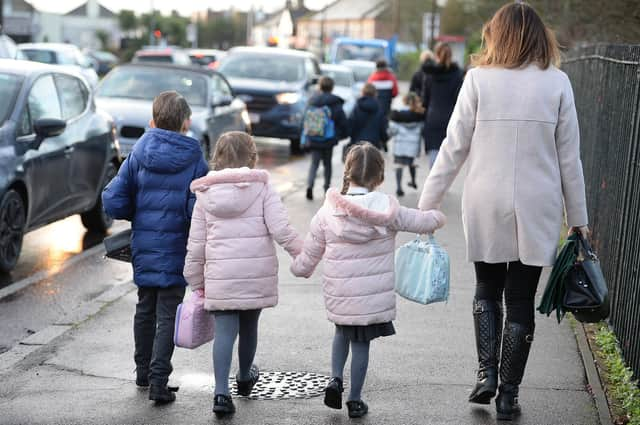MORE THAN TWO-THIRDS OF PARENTS 'WORRIED ABOUT PAYING FOR FOOD, ENERGY AND FUEL'


More than two-thirds of UK parents are worried about paying for food, energy and fuel over the next year and are being "pushed to the edge", research suggests.
Parents described feeling "overwhelmed", a "let-down" and a "failure" as cost-of-living pressures make it increasingly hard for them to afford essentials, research for Nesta found.
Advertisement
Hide AdAdvertisement
Hide AdThe fears come on top of the mental health legacy of the coronavirus pandemic, with more than half of parents fearful about the impact on their children.
The social innovation foundation commissioned Opinium Research to survey 5,000 UK parents between August 18 and 22.
It believes it is the largest survey of UK parents since the start of the pandemic in January 2020.
The polling found 74% were concerned about paying for gas and electricity, while two-thirds (67%) were worried about paying for food and petrol.
Advertisement
Hide AdAdvertisement
Hide AdWorries were highest among parents earning the least - with 82% of parents in households earning £20,000 or less worried about paying for gas and electricity and 76% worried about paying for food.
More than half of the parents surveyed were worried about affording their rent or mortgage payments (58%), credit card and personal loans (53%) and childcare (52%).
This rose to 74% of parents in London worrying about affording rent and mortgage payments, credit cards and loans.
Nesta said the results show parents are being "pushed to the edge" by the crisis.
Advertisement
Hide AdAdvertisement
Hide AdOne parent said: "I've felt a bit overwhelmed. Childcare is rare and too expensive anyway and I have to balance that with a job and rising cost of living.
"I don't know how I'll cope come the winter."
Another said: "I feel like a let-down. We haven't had a holiday abroad and I have been working a lot so we haven't had much time as a family either.
"I feel the children have been left alone and that makes me feel guilty and sad and a failure."
The survey also found 56% of parents were concerned about the impact of the pandemic on their child's mental health.
Advertisement
Hide AdAdvertisement
Hide AdThree in 10 said their child was still struggling with mental health issues that arose due to the pandemic.
More than half were worried about missed time in education due to nursery or school closures (57%), lost and missed services such as speech and language therapy (55%) and missed social interactions with other children (60%).
Ravi Gurumurthy, chief executive of Nesta, said: "The cost-of-living crisis is a mental health crisis, not just a financial one.
"Scarred by the past two years of Covid, lockdowns and school closures, parents are now anxious about the future and how they will feed their kids, pay their energy bills and mortgages, and afford childcare.
Advertisement
Hide AdAdvertisement
Hide Ad"Some families will have the resources and resilience to cope. But multiple crises are likely to leave millions struggling to get by, and will deepen inequality."
The organisation is calling for a lower energy bill cap, and more help for low-income families and for children who have fallen behind at school.
Tom Symons, deputy director of Nesta's fairer start team, said the Government must introduce free school meals for all primary school children in England, and provide additional funds to close the learning gap caused by the pandemic.
An estimate from the End Fuel Poverty Coalition suggests over 12 million UK households (42% of all households) will face fuel poverty this winter.
Advertisement
Hide AdAdvertisement
Hide AdAround 21 million people in nine million homes will be in fuel poverty after the October energy price cap rise, increasing to 28 million people in 12 million households from January, it warned.
The estimates take into account support announced by the Government.
A spokesman said: "The households affected in these numbers all face a real risk of making daily economic sacrifices that compromise their standard of living, with many of them at risk of health complications caused by living in a cold damp home."
A Government spokesperson said: "Countries around the world are grappling with rising prices but we recognise that inflation is causing significant challenges for families, which is why we are phasing in £37 billion worth of help for households throughout the year.
Advertisement
Hide AdAdvertisement
Hide Ad"That includes direct payments of at least £1,200 for eight million of the most vulnerable households alongside tax cuts and a reduction in the Universal Credit taper rate to help people keep more of what they earn."